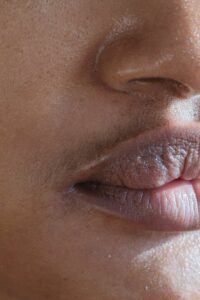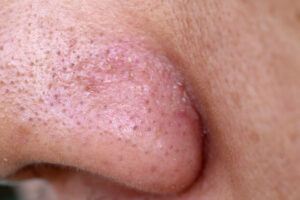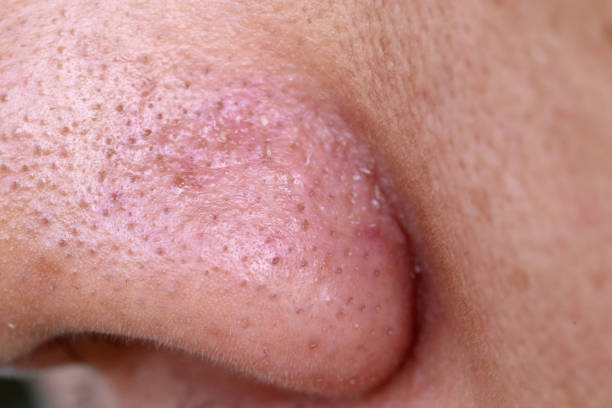If you have oily skin, naturally, you’ll find that your nose has more oil than other parts of your face. You may wake up with a very oily nose every morning, and your nose may appear shiny and greasy all day. It can be bothersome sometimes, but you’re not alone. Many people complain about having an oily nose—old and young alike— although it is especially common with teenagers and boys in their early twenties. Many factors contribute to an oily nose. In this article, we’ll be getting ourselves acquainted with them.
So what’s this thing about an oily nose, and what can you do to get it under control?
An oily nose occurs when the sebaceous glands on your nose produce more sebum than is required for hydration. This means that your nose is getting too much sebum, so it has no choice but to shine.
What are sebaceous glands? What is sebum? Sebaceous glands are found beneath the pores of your skin and are responsible for producing natural oils, referred to as sebum.
These natural oils function in keeping the skin healthy, moisturized, and hydrated. They serve as a protective covering for the skin, limiting bacterial growth and preventing skin dryness.
The production of these oils is normal for the skin. But its excess is what results in the much dreaded oily sheen you find on your nose all the time. Even if you don’t have oily skin, you can sometimes have an oily nose because of this excess sebum production. The nose is also a major area for the buildup of sweat which makes it a hot spot for oil.

CAUSES OF OILY NOSE
As we mentioned, many factors contribute to an oily nose— internal and external factors. From hormonal imbalance to genetics, even down to the type of cleanser you use— they all have their effects.
Out of the many causes of an oily nose that we have, here are the top guys in the game:
-
Enlarged Pores:
Having large pores is arguably the number one cause of an oily nose in anybody; they are a general struggle. The size of your pores determines the amount of sebum you can produce. Literally, the size of your pores is directly proportional to the amount of oil on your nose. Your pore size is mostly determined by genetics, another cause of oily nose that we want to look into.
2. Combination skin:
When you have a combination skin type, you basically have dry skin and oily skin in different parts of your face. Your cheek, nose, and forehead could be oily while the rest of your face is dry skin. Have you ever heard of the T-zone? The T-zone is made up of your forehead, nose, and chin. These parts of your face have a higher chance of being greasier and oiler.
There’s no manual, though. Having a combination skin doesn’t automatically mean you’ll have an oily nose. It’s just one of those causes that can’t be ignored.
3. Hormones:
Hormonal activity is another top reason why you probably have an oily nose. They contribute to an active and working gland. A problem with the hormones can mean a problem with the amount of natural oil produced by the sebaceous glands.
Also, men tend to have higher testosterone levels than women. Hence, they have oiler skin. With women, changes in sebum production can happen throughout their menstrual cycle due to the hormonal changes taking place at that time.
4. Genetics:
If you have an oily nose, you should probably thank your parents for it. Having large pores and sebaceous glands is a trait that can be passed down from one parent to offspring, so it’s possible that you got it from them.
5. Skin Care Routine:
How you take care of your skin plays a vital role in the general look of your skin. The products you apply to your skin also have their effects. The purpose of the natural oils produced by your skin is to keep it healthy and hydrated. But if you’re using harsh and skin-sensitive products, your sebaceous glands may be triggered to produce far more sebum to compensate.
The use of coarse exfoliators and other harsh products is another thing to take caution about. You can use a gentle skin cleanser with mild exfoliating properties, which will do its cleansing job without stripping the skin of its natural oils.
Sometimes, we make the mistake of under-moisturizing our skin. You may believe doing this would reduce the oil, but the reverse is the case. The fact that your skin has excess oil doesn’t mean it is as hydrated as necessary. Not giving the skin the much-needed moisture can trigger the glands to produce more oils to compensate for the lack of moisture.
6. Environmental Factors:
Cases of extreme temperature/weather tend to trigger excess oil production in the skin. When the weather is very hot, you sweat, and your body cools itself down by evaporating the sweat. But the consequence of this evaporation is that your body is ditching moisture to stay cool.
As this happens, your sebaceous glands produce more oil to prolong the evaporation process and maximize the cooling effect.

TIPS TO HELP PREVENT OILY NOSE
The following are tips you can apply to prevent excess production of sebum on your nose:
- Wash your face every day with a gentle cleanser and lukewarm water. It is important that you wash your face the right way to avoid skin drying in the end.
- Avoid heavy makeup, and clean off makeup before bed.
- Use oil-free makeup products so they don’t add extra oil to your face when applied.
- Apply moisturizer after washing your face to reduce the appearance of pores and keep you hydrated.
- Avoid rough exfoliators and other harsh skincare products that can damage the skin and leave it feeling dry.
- Use gentle exfoliants to remove dead cells and prevent skin dryness.
- Avoid touching your face as it can transfer oil from your hands to your nose.
- Do not over-wash your face. It is easy to fall into the trap of over-washing to keep the oils away. But repeated washing can dry your face and cause the glands to produce more oil.
- Drink enough water.
HOW TO GET RID OF OILY NOSE (REMEDIES)
-
Use moisturizer
There are many products aimed at meeting your oily nose’s needs. One of these products is a moisturizer. You should never take it out of your skincare routine, no matter your skin type. It is important to keep your skin hydrated, which is what the moisturizer will help you achieve.
People mix up oil with hydration. They don’t hydrate their skin properly because they feel their skin has all the moisture it needs anyways. We’re afraid that’s not right. A good moisturizer will balance oil and moisture levels on your skin, which is what you should aim for.
-
Use sunscreen
Research has shown that sun damage due to overexposure can make the nose pores appear larger. And you know how it is with large pores around here. A simple application of sunscreen before leaving the house in the morning will definitely go a long way. A broad-spectrum sunscreen with 30 SPF or greater is highly recommended.
-
Check your diet
Sometimes, the source of your oily nose can be the kinds of food you eat. Spicy food, dairy, cocktails, sugar, and others are foods that increase oil production in the glands. You can gradually cut down on these foods if you can’t do it at once. A good balance would be eating spicy food and drinking cocktails only once or twice a week. On the other hand, bulk up on food rich in vitamin A like spinach, carts, and zinc-rich foods like legumes, nuts, shellfish, etc. These foods help to regulate the oil-producing in the skin.
-
Drink lots of water
Staying hydrated is highly recommended in this situation. You don’t want the glands to be prompted to produce more oil on your nose than you can handle. Do your best to consume at least 2 liters of water daily, and avoid carbonated drinks and soda as much as possible.
-
Exercise
The benefits of exercise are a lot, and you know. When you work out, your body works just as it should. Exercise can help you achieve radiant and glowing skin, better immunity and circulation, and a smooth-functioning body system, keeping oil production in check.
CONCLUSION
At the end of the day, having an oily nose is not a bad thing as it happens to many people. It has pros and cons, and we just have to deal with it.
Skincare isn’t a “one size fits all.” One of the keys to getting rid of an oily nose is to recognize your triggers. Adding only a few minutes to your everyday skincare routine can dramatically reduce the chance of an oily nose.
The goal is to help our skin as much as we can, and we hope the tips just shared will help you achieve it.

